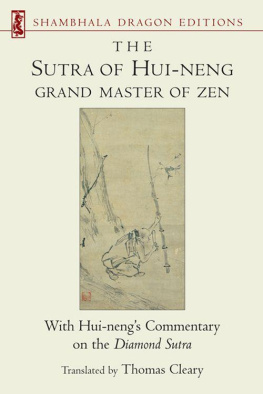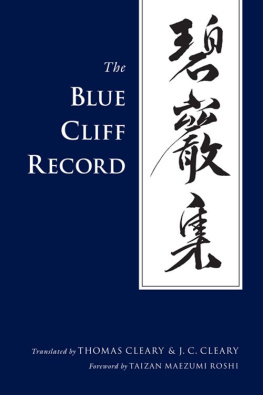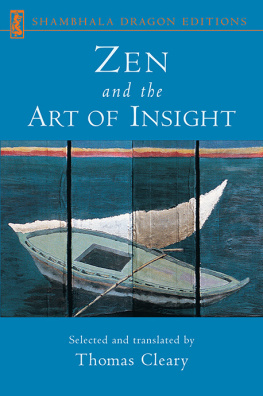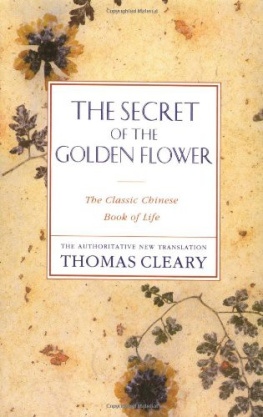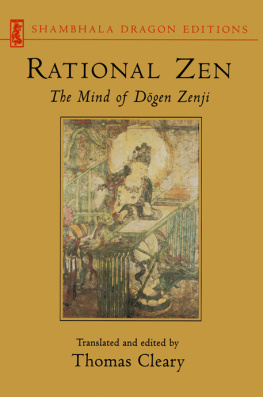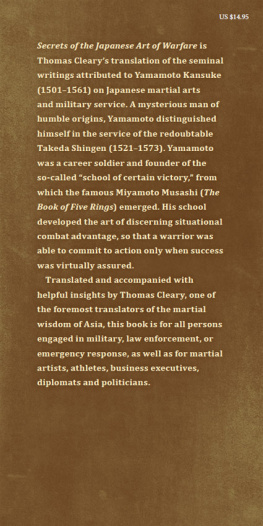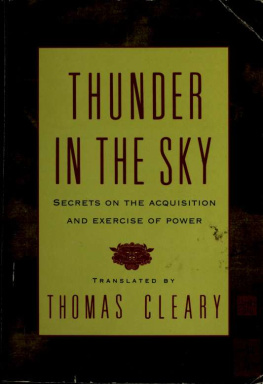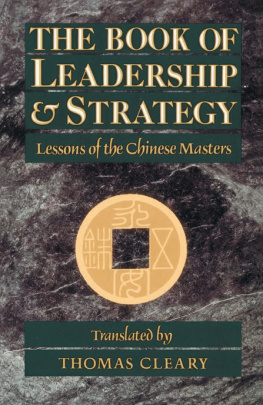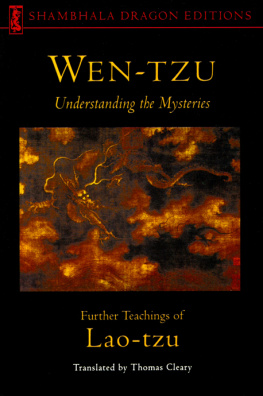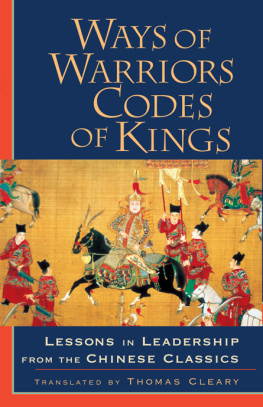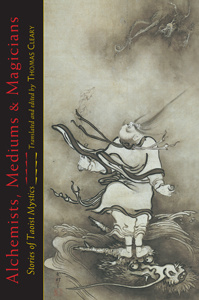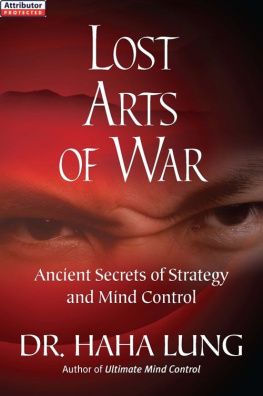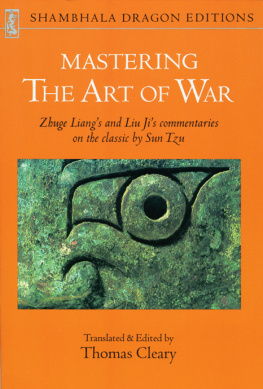Thomas Cleary - Six Secrets: A classic Chinese manual of Strategy
Here you can read online Thomas Cleary - Six Secrets: A classic Chinese manual of Strategy full text of the book (entire story) in english for free. Download pdf and epub, get meaning, cover and reviews about this ebook. year: 2014, genre: Politics. Description of the work, (preface) as well as reviews are available. Best literature library LitArk.com created for fans of good reading and offers a wide selection of genres:
Romance novel
Science fiction
Adventure
Detective
Science
History
Home and family
Prose
Art
Politics
Computer
Non-fiction
Religion
Business
Children
Humor
Choose a favorite category and find really read worthwhile books. Enjoy immersion in the world of imagination, feel the emotions of the characters or learn something new for yourself, make an fascinating discovery.

- Book:Six Secrets: A classic Chinese manual of Strategy
- Author:
- Genre:
- Year:2014
- Rating:3 / 5
- Favourites:Add to favourites
- Your mark:
- 60
- 1
- 2
- 3
- 4
- 5
Six Secrets: A classic Chinese manual of Strategy: summary, description and annotation
We offer to read an annotation, description, summary or preface (depends on what the author of the book "Six Secrets: A classic Chinese manual of Strategy" wrote himself). If you haven't found the necessary information about the book — write in the comments, we will try to find it.
Six Secrets: A classic Chinese manual of Strategy — read online for free the complete book (whole text) full work
Below is the text of the book, divided by pages. System saving the place of the last page read, allows you to conveniently read the book "Six Secrets: A classic Chinese manual of Strategy" online for free, without having to search again every time where you left off. Put a bookmark, and you can go to the page where you finished reading at any time.
Font size:
Interval:
Bookmark:
Six Secrets
A classic Chinese manual of Strategy
Translated and Edited
By
Thomas Cleary
Translators Introduction
Six Secrets is a traditional Chinese manual of political and military strategies. Generally considered a product of Chinas Era of Warring States (c. 475-221 BCE), it is represented as dialogues of iconic figures of earlier Chinese history, King Wen, King Wu, and their mentor Lu Shang, who is here referred to as Taigong, a term of respect that may be used for a father or grandfather.
King Wen (c. 1152-1056 BCE) and his son King Wu (r. 1046-1043 BCE) are famed in Chinese annals as founders of the Zhou dynasty (c. 1046-221 BCE). The documents of the Zhou dynasty are considered classics of Chinese culture by Confucian scholars. The names of these iconic kings literally mean Cultural King and Martial King, and they are also used this way symbolically in Six Secrets . Generally speaking, King Wen, the Cultural King, is the interlocutor in the sections dealing with cultural, diplomatic, and psychological tactics of war, while King Wu, the Martial King, is the interlocutor in the sections dealing with concrete military strategy.
Some fragments featuring King Wu, the Martial King, also illustrate the intertwining of cultural and military tactics of war. The culture of the Zhou dynasty is traditionally contrasted to that of the preceding dynasty, which King Wu overthrew, the ancient Shang or Yin dynasty, in terms of transition of the cultural mechanism of social control from superstition to reason, from belief in supernatural sanctions to emphasis on human agency. This is illustrated in a fragment attributed to The Six Secrets demonstrating the standard tactic of stigmatizing an enemy, using human terms in preference to supernatural signs.
In this case, when King Wu attacked the Shang, he found two men of stature whom he asked about signs of the Shang dynastys imminent downfall. One spoke of such signs as raining blood, ash, and stone, and snow in summer. The other said these were not major anomalies, citing instead signs of corrupt rule, declaring that The ruler of the Shang likes to feed people to tigers, cut peoples hearts out, kill pregnant women, kill peoples fathers, and orphan peoples sons; he likes taking and false accusation; he takes truth for deception and takes deception for truth, takes loyalty for disloyalty, kills loyal critics and rewards flattery, demotes the worthy and promotes the petty. He is demanding and rapacious; he likes hunting and comes and goes out of season; he likes building palaces and resorts, likes making lakes of wine, forests of meat, and hills of lees; he has an entourage of over three thousand who eat like oxen. There is no social order; he listens to slander when making appointments, rewards the unworthy, enriches those without integrity, lets favorites monopolize advantages and act autocratically; there is no decorum, no loyalty or trust; there are no sages, no wise men, no legal standards, no standard measures.
This practice of demonizing enemies is also found in the classic Ancient Documents, backdated to the third millennium BCE, in the account of war against the Miao tribes, led by the iconic sage Yu, also well known in legend for his civil leadership, particularly in a grand project of flood control.
Associated tactics of cultural, diplomatic, and psychological warfare expounded in the Six Secrets include deliberate encouragement of discord, corruption, and treachery within the enemys government, along with advocacy of contrasting ideals. These ideals, emphasizing fairness, justice, and economy in government, are presented as virtuous in a primarily practical sense, as keys to social solidarity, civil and military order, to achieve maximum operational efficiency.
A somewhat more direct military application of the attempt to shift attention from the supernatural to the human is illustrated in another fragment featuring Wu Wang, the Martial King:
King Wu said, The way of heaven, the spirits of the dead and the deitiesthose who obey them survive, those who disobey them perish; why do you not respect the way of heaven alone?
Taigong said, These are creations of rulers; hoping to restrain the following generations, they composed books of deceptions and attributed victory to the way of heaven. This is of no benefit for military victory, but many commanders are caught up in nine ways.
The king asked, Let me askwhat are the nine?
Taigong said, Laws and regulations are not enforced , but aggression and execution are allowed to go on; calendrical calculations are employed, without reward or good treatment; counting on the way of heaven irrespective of an enemys relative strength; watching for portents, without intelligent forethought; hoping for blessing from heaven while lacking courage and strength; not knowing the lay of the land and passing enemies on the way home; being scared to attack and relying on divination; worshiping spirits and deities instead of levying soldiers; not being skilled in setting up ambushes but relying on geomancy.
Generally speaking, the way of heaven, the spirits and deities, cannot be seen, cannot be heard, cannot be found; they cannot determine victory and defeat, cannot control death and life, so enlightened commanders are not ruled by them.
What is rejected for oneself may still be used on others. In the section on civil strategies, the Six Secrets advises rulers to stop charlatanry, weird arts, sorcery, and predictions of doom deceiving decent people, but the staff of a military commander outlined in Six Secrets still expressly includes Two professional charlatans in charge of deception, using supernatural pretexts to delude the minds of the masses. It may be no coincidence that one of the most prominent political activists of the same historical Era of Warring States in which the Six Secrets was composed, Mo Di, argued vigorously for belief in spirits watching human actions, as a means to foster morality in government as well as in private life.
Like other ancient Chinese literature, Six Secrets has a complex textual history. In time it was designated a wujing, a military classic, and became a staple of the official curriculum of candidates for degrees in military science. The word for secret used here originally referred to storage of a sword or a bow, and came to refer to keeping knowledge or ability hidden. The six containers are the main categories: first, Secrets of Civilization , dealing with political science; second, Secrets of Warfare , dealing with social, psychological, and political designs for success; Secrets of Dragons , dealing with principles and strategies of leadership and management; Secrets of Tigers , dealing with concrete combat operations and tactics; Secrets of Leopards , dealing with adaptation to different situations, likened to leopards changing their spots; and Secrets of Hounds , dealing with matters of personnel and equipment, technical and tactical specializations.
Table of Contents
Secrets of Civilization
Civil Leadership
Full and Empty
Statecraft
Overall Order
Clear Transmission
Six Safeguards
Securing the Land
Preserving a State
Promoting the Worthy
Employing the Worthy
Rewards and Penalties
Principles of the Military
Secrets of Warfare
Introduction
Beginnings of Civilization
Non-military Attack
Beginnings of Accord
Three Doubts
Secrets of Dragons
Assistants of Kings
Evaluating Generals
Selecting Generals
Appointing a General
The Authority of the General
Inspiring the Troops
Secret Signs
Secret Letters
Disposition of Troops
Surprise Operations
Secrets of Tigers
Fighting Quickly
Sure Escape
On a Border
Movement and Stillness
Next pageFont size:
Interval:
Bookmark:
Similar books «Six Secrets: A classic Chinese manual of Strategy»
Look at similar books to Six Secrets: A classic Chinese manual of Strategy. We have selected literature similar in name and meaning in the hope of providing readers with more options to find new, interesting, not yet read works.
Discussion, reviews of the book Six Secrets: A classic Chinese manual of Strategy and just readers' own opinions. Leave your comments, write what you think about the work, its meaning or the main characters. Specify what exactly you liked and what you didn't like, and why you think so.

